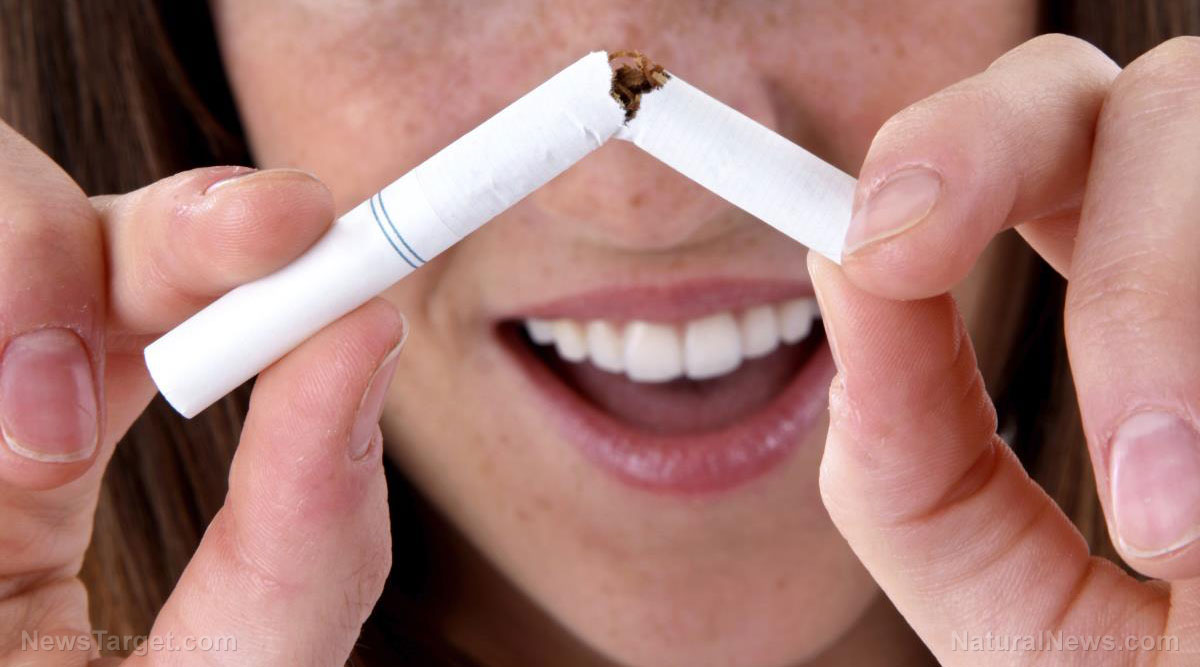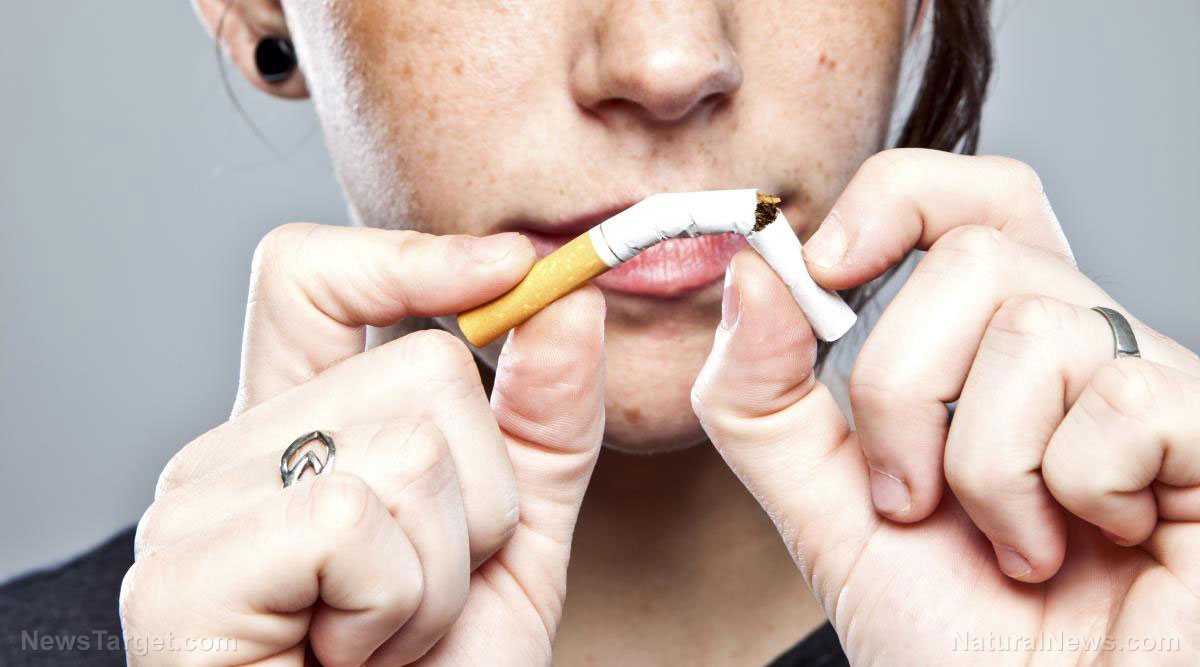Quit Smoking and get healthy – do it for the Kids!
11/24/2015 / By David Rice

A massive research project conducted by Harvard Medical School and Massachusetts General Hospital reveals that parents who seek help with the right cessation program are much more likely to stop smoking than those attempting to quit on their own. Over 7,000 parents were studied in 18 different studies, and the parents were offered self help materials, counseling, and/or medications by their pediatricians.
Many of the interventions included a visit to a well-baby or “well-child” clinic. The research tracked parental activity and success rates for over a year. The conclusion: Pediatricians who recommend the right cessation programs to the parents were more likely to see them stop smoking, especially because of the “teachable moment” during the visit, regarding their children’s vulnerability to the devastating effects of the tobacco smoke (http://www.reuters.com). Though they are considered short term studies, Dr. Winickoff at Harvard Medical School says they are “worth pursuing,” and that the best programs will enable nearly every parent to quit smoking.
Sue Curry, the Dean of University of Iowa’s College of Public Health, says that one of her studies, included in the analysis, found that mothers who were given a quitting guide along with counseling advice were twice as likely to quit as mothers who didn’t receive this kind of help.
Research shows that the children of parents who smoked during pregnancy have inflamed arterial walls, which is linked to a higher risk of cardiovascular disease, asthma, sudden infant death syndrome (SIDS), and a long list of other critical illnesses.
Second-hand smoke as bad if not WORSE for the children
“Cigarette smoke, whether first-hand or second-hand, has been linked with countless physical health ailments, including the major killers cancer and heart disease. And it could affect one’s mental and emotional state, too. According to USA Today, a report which was presented at the American Psychosomatic Society meeting held in Chicago had found that passive smoking more than doubled a person’s risk of getting major depression, as compared to non-smokers who were not exposed to second-hand smoke.”
Details and Findings of Study
For the study, assessment on second-hand smoke exposure was carried out by measuring cotinine, which is a compound found in the bloodstream after one inhales smoke, as well as self-reported information on contact with smokers at home or at work. Out of over 90,000 non-smoking study subjects, cotinine levels were available for over 3,000 of them. The subjects were also surveyed for the symptoms of depression. Either way, whether or not cotinine levels were available, exposure to second-hand smoke was strongly linked with major depression. This was said to be the first American study drawing such a link, and it affirmed the findings of a previous Japanese study. That study, though, did not use cotinine levels.
Second-hand Smoke and Cognitive Impairment
The mental issues caused by second-hand smoke could extend beyond depression, too. A study recently published in the British Medical Journal associated such exposure for non-smokers with significantly increased risk of suffering cognitive impairment. In fact, after accounting for many established risk factors for cognitive impairment, it was found that those with the highest levels of cotinine in their blood (0.8-13.5 ng/ml) were 44% more likely to suffer such ailments as compared to those with the lowest levels (0.0-0.1 ng/ml).
Similar patterns were found for formers smokers and persons who had never smoked before.
“A recent study conducted at the Florida State University helped to shed further light on this issue. It had found that laboratory rats which were exposed to nicotine during adolescence were more prone to suffer a “depression-like state” during adulthood; this included decreased ability to cope with stress and anxiety as well as reduced sensitivity to rewards. Significantly, even very brief exposure – just a day – to nicotine was enough to cause such outcomes. The researchers further found that these symptoms could be alleviated by administering nicotine or antidepressants during adulthood. That study was groundbreaking in revealing that nicotine exposure in one’s early years could result in long-term effects on one’s mental state. While it was conducted on rats, it is possible that similar effects could also take place in humans. In addition, the study’s findings lend credence to the belief that smoking could contribute to mental disorders like depression, as supposed to the other way round.”
Learn more: (this was published back in 2009 – Thanks Reuben Chow!) http://www.naturalnews.com/025912_depression_health_exposure.html#ixzz3rmglRrBT
Think of the money you will have for VACATIONS! Try $500,000 in 20 years or less!
Hello, smokers around the world. Big question: If half a million dollars in cash was on the table and you had to decide right now to quit smoking cigarettes and never pick up another one, would you pick up the pack of Marlboro Reds or the fat stack of cash?! Every smoker in the world has heard at least once how much money they’re wasting on cigarettes. They usually hear it from their relatives. Somebody did the math, and it was ugly, but it obviously still didn’t matter enough. So who’s talking about $500,000 now? That’s half a million dollars. Could this much money really be at stake, today, when you make that choice? Rising cost of a pack of cigarettes The cost of a pack of cancer sticks ranges from $5.00 to $14.50, depending on city, county and state, and of course, being in a state the grows the MOST tobacco helps, like Kentucky. In metropolitan cities like New York, cigarettes cost over $14.00 per pack! And so the math gets started at a pack a day in New York, and over 15 years the grand total is $79,387. Let’s call it an even $80,000. In some US states, packs of cigarettes have jumped in cost 35 percent in just one year, as has been the case in New Hampshire and Vermont. In New Jersey, cigarettes run more than $9.00 per pack. Same goes for Alaska, Hawaii and Arizona. In Illinois, a pack of smokes runs you over 11 bucks. Menthol cigarettes comprise over 30% of the total cigarette market. Those prices jump around, usually up, along with cloves and flavored cigarettes. Either way, it all adds up faster than most people ever want to consider. Plus, the cost of the cigarettes is just the tip of the iceberg.
Compounding costs of being a smoker The following are estimates based on typical costs in the USA over 15 years: Teeth-whitening kits (at home and at dentist): Ranges from $25 to $300 (for quality ones that still only last six months). Add up $300 every six months for 15 years and that’s… cha-ching (sound of cash register): $9,000. Dry cleaning and clothing damage: Clothes stink, dress shirts get stains, and burn spots ruin them: $14,000. Gas: Extra trips to the convenient stores, grocery stores and drug stores add up: $750. Sleep aids: Millions of smokers have insomnia thanks to chemicals in cigarettes: $15,400. Libido enhancers: Millions of smokers lose some or all of their sex drive due to chemicals in cigarettes: $12,200. Air fresheners (that are also toxic): Candles and disinfectant sprays, etc: $26,000. Lighters: $1,440. Breath fresheners: chewing gum, mints and mouthwashes: $6,480. Medicine (over-the-counter and prescribed) — for cough/cold/flu: $13,000. Pain killers for muscles/joints/headaches (aspirin, ibuprofen and prescription): $9,000.
True cost of diseases and disorders:
- Gum disease, tooth and root decay (doctors, dentists, oral surgeons)
- Cancer (lung, breast, bladder, prostate, stomach or of the mouth and skin)
- Diabetes I or II, or even border-line diagnosis
- Emphysema
- Ulcers
- Chronic congestion, hypertension, CNS (central nervous system) disorders, anxiety, inflammation
- Depression
- Digestive disorders like Crohn’s, IBS (irritable bowels)
http://www.naturalnews.com/048130_stop_smoking_saving_money_health_improvements.html#ixzz3rmh6gBf6
Quit Smoking Naturally in 14 Days or Less –
The “Stop Smoking King” tells you how right here and NOW
So many people make good health a complicated matter by polluting their bodies with processed foods, irradiated foods, genetically modified foods, gluten, bleached foods, hormone-laden meats and milk, and a host of other toxic products that punish the body instead of rewarding it for doing work for you. Your body wakes up in the morning and your organs want food. They do not want food that comes from laboratories or factories that cook it to death and plug in additives and cell-choking preservatives. Your body is a machine, and it needs clean oil, meaning organic fuel, to run smoothly. This is fairly simple. You take a handful of organic spinach, some organic rice milk or almond milk, half of an organic apple and a little ice (from non-fluoridated water), and you blend it up in a smoothie maker, a NutriBullet or even a good blender, although blenders don’t break up the greens so well (http://www.youtube.com).
The best green shakes contain kale, spinach, collard, chard or romaine. You should rotate your greens regularly. Other good mixes for these shakes include pears, bananas, mangos, pineapples and spring water. Top it off with organic lemon or lime juice! Almond milk and rice milk are always smart alternatives to using dairy. You can juice vegetables also and add the juice to smoothies; plus, you can always save the vegetable pulp and use it in a casserole, serve it on top of basmati rice or quinoa, use it as toppings for salads or even as compost in your garden. Also, drink plenty of organic carrot juice and organic beet juice and eat raw organic cruciferous vegetables consistently.
Arm yourself with organic weapons that destroy cancer cells!
- Fight skin cancer with raw foods: Check out coconut oil, organic honey, organic cinnamon and organic garlic and your taste buds will thank you right before your body thanks you. (http://www.cancertutor.com) 2. Fight lung cancer and inflammation: RejuvenZyme and Barley Power are two superb enzyme supplements. Both of these products are highly endorsed to reduce swelling, inflammation and congestion in the lungs. The enzymes in RejuvenZyme will also help the immune system recognize cancer cells as cancer cells. 3. Fight breast cancer with kale salad: (http://breastcancerconqueror.com) Who knew? They won’t say it on TV or the “Nightly News” or they’ll lose their sponsors. We all know what we’re talking about, though. Why is that? Are you afraid that food can’t cure your cell disorder because they don’t say it on TV or on organic food labels? That’s because the FDA outlaws it. There is a lot more money to be made off sick people than healthy ones, don’t you know? Why won’t organic herbs and tinctures come as a “prescription”? Hundreds of thousands of health enthusiasts know the answer to this question, but the tens of millions of average “Joes” have no clue. Bottom line: “Don’t eat cancer” and it won’t eat you. (http://programs.webseed.com) Did you know that six months of chemo can cost $50,000, and a five-week course of radiation can cost $60,000 or more? One single surgery to remove a tumor can set you back $40,000. It’s mostly a scam too, because all of these procedures can easily spread new cancers, but people are finding out via natural and alternative news. (http://www.naturalnews.com)
Never doubt the power of organic food to heal
http://www.naturalnews.com/034666_longevity_aging_prevention.html#ixzz38nz03RIC
Mike Adams, the Health Ranger and Editor-in-Chief of NaturalNews.com
has this to say about 14AndOut Stop Smoking Course:
“14 & Out offers smokers a new approach to quitting the smoking habit for good – – an approach that frees you from all corporation chemicals and their physiological addictions. It does this by addressing smoking addiction with a multi-layered approach, reforming smoking behaviors, detoxifying the body from chemicals that promote addiction, and supporting the body’s healthy functioning with a sound nutritional approach that works with the brain’s natural chemistry to break addictions at a molecular level.”
The End of Cigarettes in 60 minutes!
FREE TRAILER of the 60-MINUTE COURSE
Watch this: http://programs.naturalnews.com/14AndOut__TV.htm
Quit Smoking, Get Healthy, and Do It for Your Lover … and the Kids!
Other sources about 14AndOut and the “Stop Smoking King”
success stories including testimonials and recommendations:
http://14andout.blogspot.com/2015/04/david-wolfe-recommends-natural-method.html
Tagged Under: best stop smoking aid, end addiction, end anxiety, how to quit cigarettes, methods for quitting smoking, stop drugs























